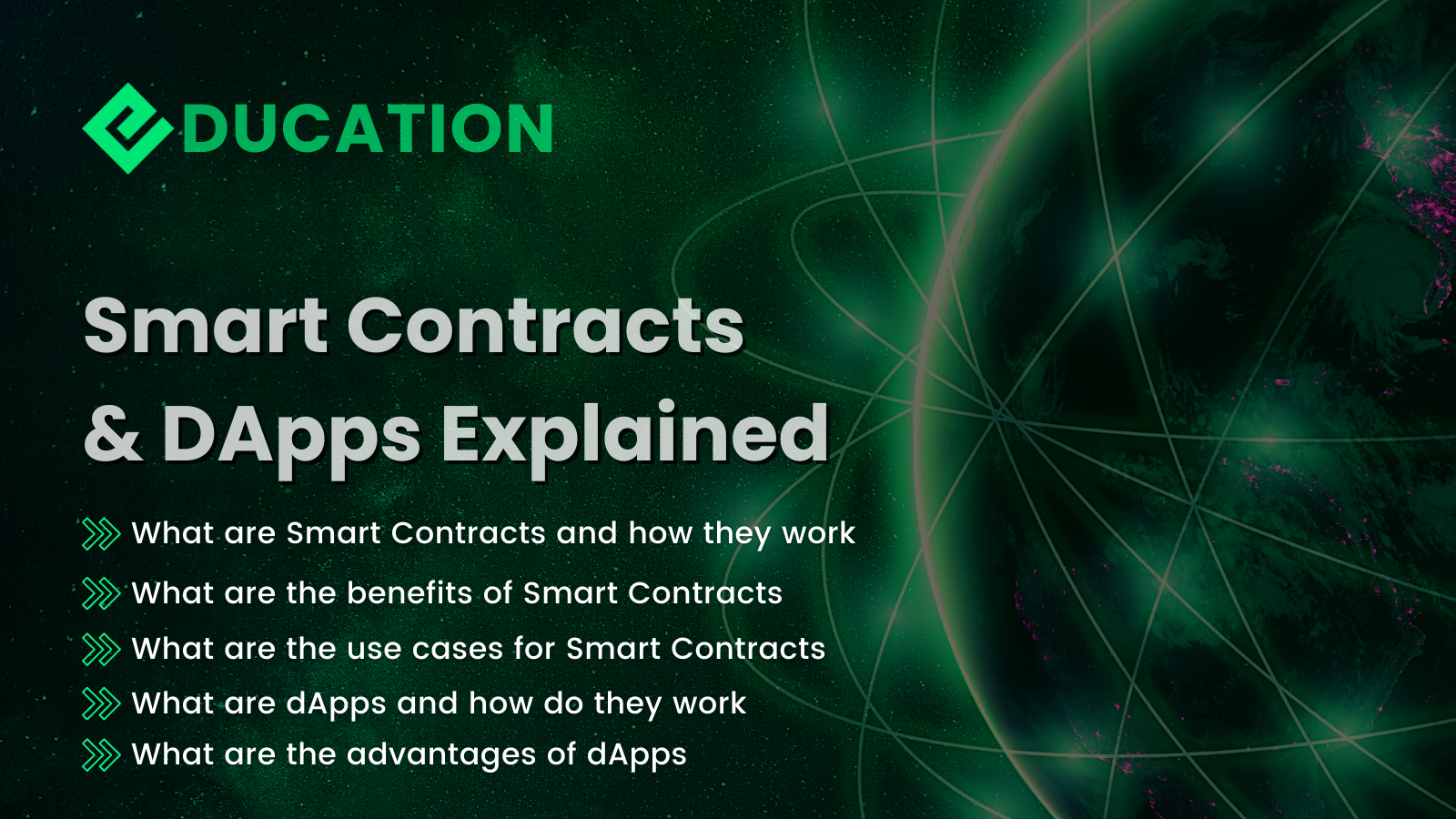Smart Contracts & dApps Explained
Written by Mike Antolin


It’s safe to say that many industries nowadays are moving towards digitization. One of the innovations that have made this transition possible is blockchain technology.
Among the main components of this game-changing technology are smart contracts and DApps.
Smart contracts are documented agreements between two people or parties in the form of computer codes. They exist across a blockchain network, meaning their data cannot be changed.
DApps, otherwise known as decentralized apps, run on peer-to-peer blockchain networks.
What Is a Smart Contract and How Does It Work?
A smart contract is a self-executing type of contract in which the terms of the agreement between the two parties involved are directly inscribed into computer lines of code.
These lines of code and the contract itself exist across a blockchain network, meaning its data cannot be changed.
What Are the Benefits of a Smart Contract?
Elimination of the “Middleman”
One of the benefits of a smart contract is that it has eliminated the need for third parties like lawyers.
For starters, transactions between the two parties involved cannot only be made if the terms of the agreement are met.
This eliminates a “middleman” like a lawyer to ensure that both parties have fulfilled the contract terms.
They Are Secure
Smart contracts are secure because they are decentralized. This means that they are not controlled by one party, thanks to blockchain technology.
Since they are decentralized, it is impossible to tamper with them in any way.
What are the Uses of Smart Contracts?
Insurance Companies
This is one sector that significantly benefits from this innovation. An insurance company can provide insurance using a smart contract.
Then the compensation will be released to the individual when the terms of the agreement are met.
For instance, a flight insurance company can provide insurance using a smart contract, stating that the company will compensate the individual only if their flight is delayed at least 2 hours.
So, the insurance company will automatically pay the client/individual if the smart contract terms are met.
What Is a dApp and How Does it Work?
Decentralized apps (dApps) are software applications that operate on peer-to-peer blockchain networks rather than on one central computer.
They are just like the regular apps on your phone but are supported by peer-to-peer (P2P) blockchain networks.
Like a smart contract, a DApp is decentralized, meaning it is not controlled by a single authority. Instead, it is controlled by a blockchain distributed ledger, meaning multiple sources control it.
What Are the Advantages of dApps?
Since dApps are not controlled by a single authority, it is quite difficult for anyone to block users from accessing the app.
Another advantage is that users do not have to share their personal information to use a DApp.
Decentralized apps also rarely fail since they don’t rely on a single hosting server.
This feature makes these apps secure because it is difficult for hackers to hack into all hosting servers supporting a particular app.
What are the Uses for DApps?
Crypto Wallets
Many crypto wallet apps, specifically non-custodial ones, utilize the concept of decentralized apps. This allows account users to be in more control of their accounts.
Gaming
Nowadays, more and more decentralized gaming apps are being developed. These types of games mostly incorporate NFTs, allowing gamers to retain the value of the items they purchase in the game.
Conclusion
Smart contracts and DApps have one thing in common; they are not controlled by one entity.
This characteristic alone has paved the way for people to enjoy more benefits from these two concepts, such as security and flexibility.
- Learn Blockchain Basics
- Learn NFTs Explained
- Learn NFT Minting Tips
- Learn Blockchain Pros vs Cons
Sign up to our Newsletter
Be sure to follow us on Twitter and Telegram for the latest Energi News, and join our vibrant Discord channels to connect with others, learn more about the world of Crypto & NFTs and be part of the Energi Community.
